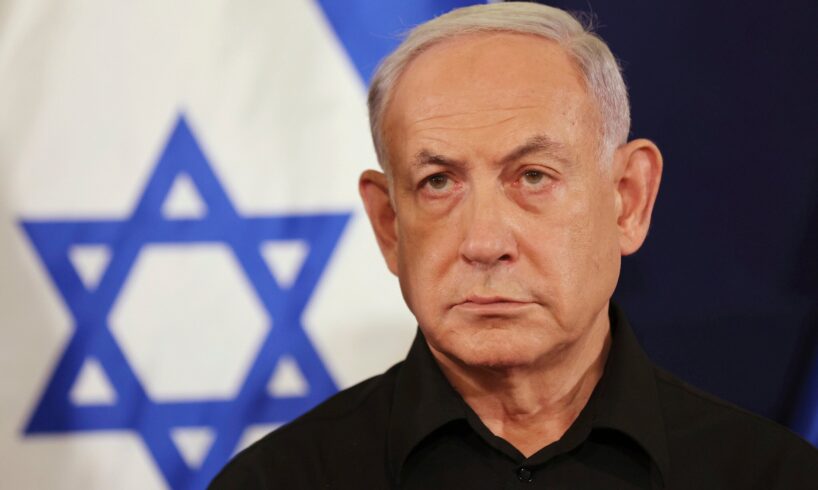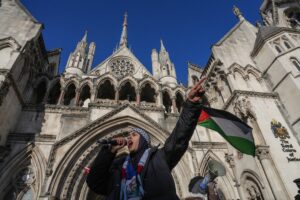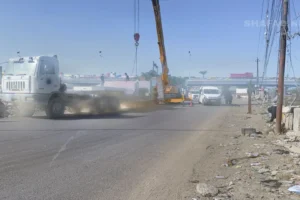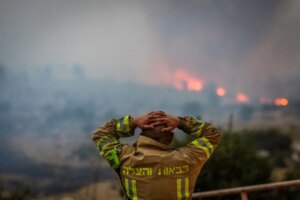
Bereaved families and opposition lawmakers accused the government of working to absolve itself of any responsibility over the October 7, 2023, failures, amid reports the coalition is considering establishing and appointing its own panel to investigate the catastrophic Hamas invasion and subsequent war instead of an impartial state commission of inquiry.
And the government-appointed panel may also investigate the supposed “role” of the anti-government protests against the judicial overhaul agenda, and even that of the High Court of Justice, as part of the broader investigation into the events that led up to October 7, Hebrew media reported Saturday.
The government has long resisted establishing a state commission of inquiry, with cabinet ministers first arguing that such an investigation was inappropriate during wartime and then claiming it would not be impartial since its members would be appointed by the liberal Supreme Court president Isaac Amit.
The members of a government commission of inquiry would be chosen by the government, with critics accusing the government and Prime Minister Benjamin Netanyahu in particular of seeking to be in charge of investigating itself over the disaster.
According to a Channel 12 report, the government is considering appointing recently retired Supreme Court judge Yosef Elron, a hardline conservative who frequently ruled in favor of the government, to head the commission.
Get The Times of Israel’s Daily Edition
by email and never miss our top stories
By signing up, you agree to the terms
However, Elron, through the Supreme Court office, quickly pointed out in a statement to the press that he is only three weeks into the three-month post-retirement period in which he must finish writing opinions on the cases he presided over where a ruling is still pending.
The statement said Elron would be concentrating solely on those cases “and nothing else” until that period ends.
Hamas terrorists are seen near the Gama Junction in southern Israel, close to Re’im and Kissufim, amid the October 7, 2023, onslaught. (South First Responders)
Another figure apparently floated by the government is Judge Asher Kula, who was picked by the coalition in May to serve as the state ombudsman for judges.
The coalition is also reportedly seeking to broaden the scope of investigation beyond the October 7 attack, the failures that allowed it to occur, and the subsequent war, and look at the supposed impact of anti-government protests and decisions by the High Court of Justice on Hamas’s decision to attack.
The investigation would “include the role of the High Court, the role of former defense ministers, and the role of the [anti-government] protest movement,” Ynet quoted a senior Likud official as saying, who added “We don’t trust Isaac Amit to do this.”
Anti-overhaul activists protest outside the Supreme Court in Jerusalem, September 11, 2023. (Noam Revkin Fenton/Flash90)
Numerous protest organizations, government watchdog groups, and opposition MKs denounced the government over its reported plan.
“Over the course of two years, the prime minister claimed that it was not possible to investigate while the war was ongoing,” said the October Council association of bereaved families from the October 7 attack, hostages’ families, and survivors of the Hamas massacre.
“Unfortunately… it seems that the prime minister is choosing to [carry out a] cover-up, to conceal, and to appoint the investigators himself — despite the fact that he is one of the central [figures] that the commission that will be established will investigate.”
National Unity MK Gadi Eisenkot, a former IDF chief of staff whose son and nephew were killed fighting in the war, also blasted the government, saying, “The one who led [the country] with complete blindness cannot fix and rehabilitate, the one who is responsible cannot appoint the investigators, he who was in office on October 6 cannot unite. There will be no revival for Israel until trust is restored between the people and their leaders.” He demanded “elections and the establishment of a state commission of inquiry, to clarify the truth and renew trust.”
Then-MK Gadi Eisenkot holds a press conference after announcing his resignation from the Knesset and his departure from the National Unity party, in Tel Aviv, July 1, 2025. (Erik Marmor/Flash90)
And the Movement for Quality Government in Israel, which has petitioned the High Court of Justice demanding the establishment of a state commission of inquiry, said in response to the report that a government commission of inquiry “would be subject to the government’s political interests” and that “this is a transparent and blatant attempt to evade the establishment of an independent, impartial, state commission of inquiry whose role is to investigate the gravest failure in the history of the state.”
Last week, the High Court told the government that there was “no real argument” against establishing a state commission of inquiry into October 7, in response to petitions demanding such an investigation.
The wording of the decision by the three judges, including staunch conservative David Mintz, was seen by petitioners as an indication that the court will ultimately tell the government that a state commission of inquiry is necessary.
Family and friends of slain hostage Eitan Levy attend his funeral at the Holon-Bat Yam Cemetery, October 16, 2025. (Avshalom Sassoni/Flash90)
A state commission of inquiry is established by the government, but its members are appointed by the Supreme Court president and are entirely independent of government control. It also has unique powers of investigation, including subpoena power.
In a government commission of inquiry, a cabinet minister approves the establishment of the panel and that minister also appoints its members. A government commission of inquiry also has less power than a state commission of inquiry, unless the appointing minister appoints a retired judge to head it.
State commissions of inquiry have been established in the past to look into other military failures, including the events of the Yom Kippur War in 1973 and the Sabra and Shatila massacre in Lebanon in 1982.
A government commission of inquiry, in which the government appoints the members of the commission, was established to investigate the failures of the 2006 Second Lebanon War, although it was granted the powers of the more rigorous and independent state commissions, including the power to subpoena witnesses.
You appreciate our journalism
You clearly find our careful reporting valuable, in a time when facts are often distorted and news coverage often lacks context.
Your support is essential to continue our work. We want to continue delivering the professional journalism you value, even as the demands on our newsroom have grown dramatically since October 7.
So today, please consider joining our reader support group, The Times of Israel Community. For as little as $6 a month you’ll become our partners while enjoying The Times of Israel AD-FREE, as well as accessing exclusive content available only to Times of Israel Community members.
Thank you,
David Horovitz, Founding Editor of The Times of Israel
Join Our Community
Join Our Community
Already a member? Sign in to stop seeing this





